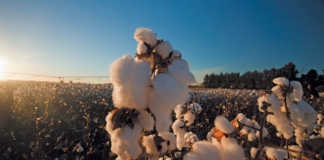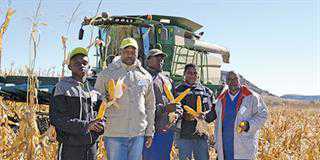According to statistics provided by the National Wool Growers’ Association (NWGA), the KZN sheep population has declined from 341 532 in 1997/98 to 244 706 in 2004/05 – a drop of 96 826.
A guest speaker at the meeting, Johannes Klopper, who is a member of NWGA in Ermelo and an ardent stock-theft fighter, said although farmers were continually being told stock theft was decreasing as a result of police efforts, this was not necessarily true in the sheep sector. “Figures of sheep theft may seem to be declining, but this is most likely only because the provincial flock has declined in size so dramatically.
There are nearly 100 000 fewer sheep to steal now, so police statistics will show a decline in opened cases, yet there is currently even more pressure on the remaining farmers,” Klopper said. “Police figures will also be inaccurate because many farmers now don’t report thefts to the police, either because they have no faith in the SAPS or because certain police officers don’t bother to come to farms to take statements or conduct investigations.” In 2005/06 police figures show at least 15 295 sheep were stolen in KZN with only 1 874 recovered. Adding insult to injury is that many stolen animals had been discovered dead after enduring severe cruelty from thieves.
Evidence exists in many cases where numerous sheep had been maimed by thieves and then left to die in the veld. The thieves did not take any meat away with them. Klopper said sheep theft in the region had declined appreciably since a small group of members there banded together to form their own anti-stock-theft committee. H e explained, “This committee collects all reports on the whereabouts and activities of known and suspected stock thieves using informers and vigilant farmers. None of this information is given to the police until the committee is absolutely sure it has enough to guarantee the arrests and convictions of perpetrators.
We are also continually giving prosecutors hands-on education regarding the impacts of stock theft and are encouraging them to wholeheartedly pursue convictions in these cases.” Klopper warned that many stock theft cases in Ermelo were previously thrown out of court on technicalities. He encouraged farmers across the country to assist the police and state prosecutors in correctly filling out charge dockets, and to also form positive working and social relationships with these legal authorities.
“Report every single case of theft to the police, even if you can’t do it immediately. The only way government will begin acknowledging the stock-theft problem is if it has the true figures in its hands. If a police officer is incapable of accurately taking a statement, it is legal for a farmer to write the statement up, sign it, and get the police officer to sign it too,” Klopper advised. Be specific about the numbers, sexes, ages and prices of the stolen animals, and keep a copy of the statement so that you don’t contradict yourself in court if the case only appears months down the line, he suggested.
With the expansion of the NWGA’s stock-theft committee concept throughout Mpumalanga’s sheep farming areas, Klopper said convictions had increased from a mere 32% to the current 92%. He acknowledged that KZN faced differing circumstances that led to stock theft to those of Mpumalanga, but said that the stock theft committee concept could be adapted to suit any region.













